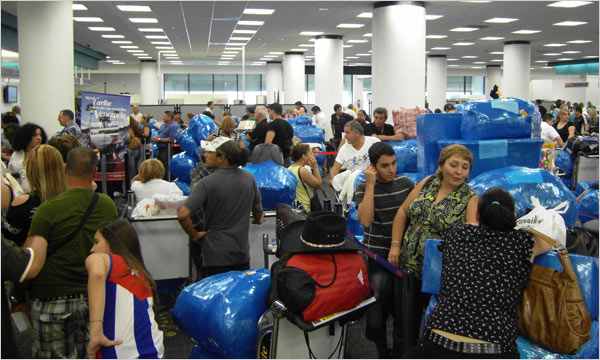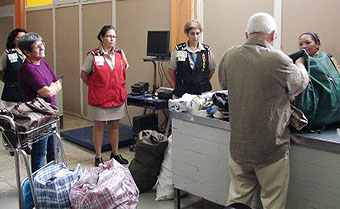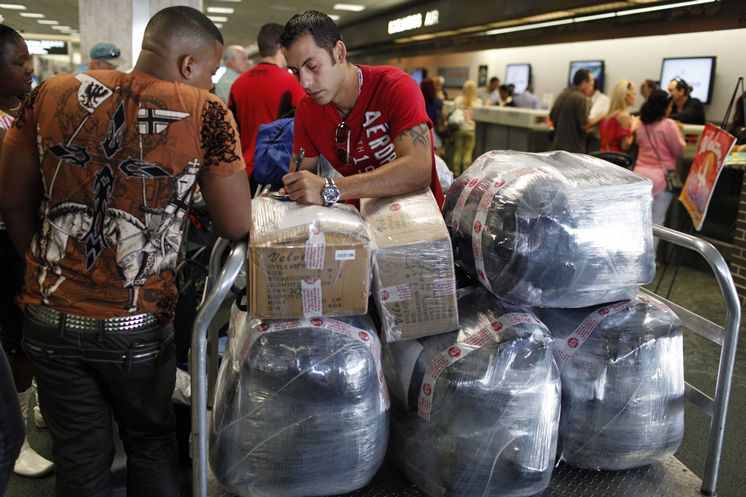
Cuban Customs officials respond to citizen complaints
Citizen complaints about the recently announced Customs restrictions seem to have touched the editors of the official newspaper Granma, who this week sent two reporters to convey those complaints to Customs officials.
“Incomprehensible, distanced from Cuban reality; unfair, because they mix the law-breakers with those who are not; excessively administrative, which feeds the germ of corruption; even not attune to the measures implemented in the actualization of the economic model, such as, for example, the development of self-employed workers” is how Granma describes the complaints.
Those, the newspaper says, are some of the reactions to Customs Resolutions Nos. 206, 207 and 208, and No. 300 of the Finance Ministry that will take effect on Sept. 1. (For background in Progreso Weekly, click here and here.)
In an article Friday (July 18) titled “The measures don’t mean that people can’t import,” Granma says that, after monitoring the flow of merchandise carried by Cubans returning from abroad or sent from abroad via courier, Customs officials determined “that the quantities [of merchandise] were being exploited or could be exploited for commercial purposes. In other words, claiming that the goods were not commercial, people were using the importations for profiteering.”
In addition to their personal belongings, travelers can bring in as much as US$1,000 in consumer goods without having to pay import fees; the maximum weight for duty-free baggage is 30 kilograms (66 pounds), Granma notes.
(To read the list of restrictions, in Spanish, click here.)
Between January and May of this year, 90 percent of the travelers arriving in Cuba followed the restrictions and were cleared swiftly through Customs. A considerable number of others had their baggage inspected but didn’t have to pay duty, the Customs officials said.
Then there’s the people who massively and constantly exceed the regulations.
“Customs has the ability to recognize the passengers who incur in these violations, but we can’t know everybody,” says Idalmis Rosales, a deputy director of Customs. “There are resources to identify this group of people who are recidivists, and we shall act objectively toward them or toward anyone who breaks the law.”
As to the possibility of passengers bribing Customs inspectors, “any measure that leaves margin for assessment [of imported goods] is a source of, or condition for, corruption,” Rosales says. “It is up to us to strengthen our work system, which includes prevention, education, and ensuring that the department heads really monitor” the inspectors.
The whole idea is “to minimize the contact between passenger and inspector, because that’s primarily where scenarios that foster corruption are generated,” the official says.
“The duration of these measures will depend on the development of our economy,” Rosales explains. The new resolutions “are intended to regulate non-commercial importation, because that cannot be the way to supply the needs of various forms of non-state activities, such as self-employed entrepreneurship.
“To do that, we’d have to come up with a formula or regulation that allows the importation [by entrepreneurs] for commercial purposes.” No such formula exists.
“A passenger who, for the first time, brings in a certain amount of goods that qualify — because of their nature, function, quantity, or repeated importation — as an importation of a commercial nature, will suffer the confiscation of the amounts in excess of the established limits,” Rosales continued.
“If he is a recidivist, he will suffer the confiscation of all the articles, with the exception of his personal belongings.”
The Customs officials stressed that “the shortage of products or their quality cannot be satisfied by this type of commercial importation, under cover of non-commercial amounts.”
And unrestricted importation “cannot be used as a substitute for a wholesale market, which at present we do not have but is contemplated in […] Guideline No. 9, which says, ‘We shall develop supply markets that sell goods at wholesale prices.'”
The Customs officials insisted that the new rules are intended to regulate non-commercial importations, not to find a solution for needs that must be satisfied with commercial importations.
(To read the entire Granma article, in Spanish, click here.)
[Photos from The New York Times, Tampa Bay Times, and Guerrilleros.cu]



